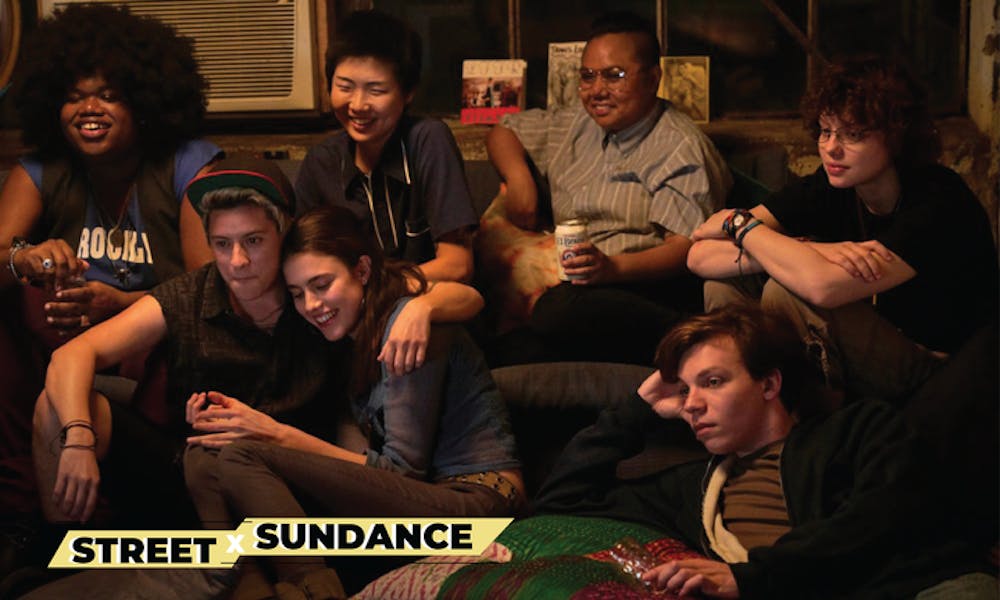It’s a rare thing to see a socially conscious film held with care and comedy, and Adam is just that. The movie—directed by Rhys Ernst, a queer filmmaker who has worked as a producer on Amazon Studios’ Transparent—resembles something of a queer The Perks of Being a Wallflower crossed with radical sexual politics.
Adam is an adaptation of Ariel Schrag’s 2014 young adult novel of the same name. It follows a teenage high schooler named Adam (Nicholas Alexander), who goes to stay with his sister Casey for the summer, who is living in Brooklyn between semesters at Columbia. Casey is a sexually active lesbian woman, not yet out to her parents. She’s tapped into the LGBT scene of the city, is politically active in downtown rallies, and lives and socializes entirely with queer people.
This rainbow immersion initially comes as a shock to Adam. He hasn’t seen his sister in this environment before, and his personal politics have a lot of catching up to do. But Adam ends up meeting a young redheaded woman named Gillian (played by the Instagram–famous young artist Bobbi Salvör Menuez), who looks like a young Julianne Moore and mistakes Adam for a trans man. They ignite a summer fling full of confusion and learning in a tender coming–of–age movie that is ripe with educational moments.
As the summer progresses, Adam nestles himself further into Casey’s queer friend group, and keeps up the ruse with Gillian. Weeks pass, and Adam doesn’t know how her can break the news to her. He doesn’t work, and spends time holed up in his closet–sized bedroom Googling trans issues. He solicits advice from Casey’s straight male roommate Ethan, who stands in as a big brother figure in this confusing time. Together, Gillian and Adam traipse all over the city, hitting up bondage clubs, immersive art installations, and house parties.
As a film, Adam has a slow worldliness, a perfect match for its depiction of a tight–knit queer micro–community. This smallness and interconnection of characters gets sticky for Casey and her friends, as the lines between queer friendship and romance get criss–crossed.
Much of the film’s hilarity is due to its firm status as a tongue–in–cheek 2006 period piece, replete with all the right cultural references to satirize the progressive LGBT millennials of the day. It carries a sweet tweeness, the film equivalent of a person who wears a puka shell necklace and has a Moldy Peaches ringtone on their flip phone. In a moment of comedy, Casey drags Adam to a viewing party for The L Word. The film has funny eye–roll lines, delivered in a rapid–fire Gilmore Girls fashion that pokes fun at East Coast liberalism. Some choice selections include ”We went to Smith together!” and “Casey works at American Apparel, so she gets crazy discounts!”
Adam is especially groundbreaking in its portrayal of a plurality of queer experiences. Young Casey is a malleable lesbian whose sense of self is dependent on her partner of the week. There are the more confident foil characters to Casey, as there seem to be for every character in the film. There are the tentatively gay and the out and proud, the militant and the assimilationist.
At one point, there’s a showdown between marriage equality activists and anti–homonormativity protestors, displaying the difference of political opinions within the LGBT community. Characters have ambiguous sexualities, all manners of self–presentation, and a sense of authenticity that can only come from queer actors playing queer parts. It’s one of the only films I can think of that truthfully depicts the heterogeneity of a living, breathing queer community.
Adam also has some emphatically up–to–date, progressive politics, and the film uses its 95–minute runtime to gently impart them onto the audience. It tackles LGBT issues with a purposeful didacticism; Adam does copious research on female–to–male transitioning, Casey explains violence against trans women to one of Adam’s ignorant friends, and Adam himself gets shaken down for pretending to be a trans man. Though welcome, the film can feel slightly overstuffed with learning moments, some of which come at inorganic points and seem to be checking off topics on a Gender Studies 101 syllabus. That being said, Adam is a perfect film for an older adolescent looking to upgrade their terminology and political understandings.
Adam’s true strength, however, is its portrayal of individual growth and political development. Alexander’s tender performance as a meek virgin lends the film a sweetness that seems to dismiss some of his misguided behavior. Rather than being written off entirely, he and Gillian are able to dissect their experiences at the end of the summer, with help from friends and confidants who chime in with their own ethical, political, and moral concerns.
Adam is all about pushing personal comfort zones and taking time to educate the less woke, all while retaining a certain optimism. As the film concludes, there’s the sense that Adam will never be the same, that his world views and conceptions have been challenged for the better. And in a last line of hilarious dialogue about the New York City skyline, it’s apparent that he still has much learning to do.

